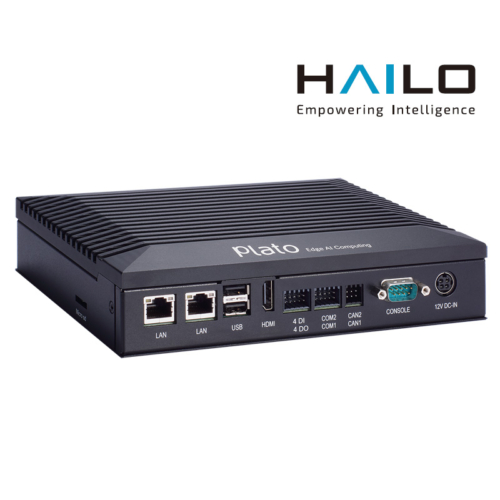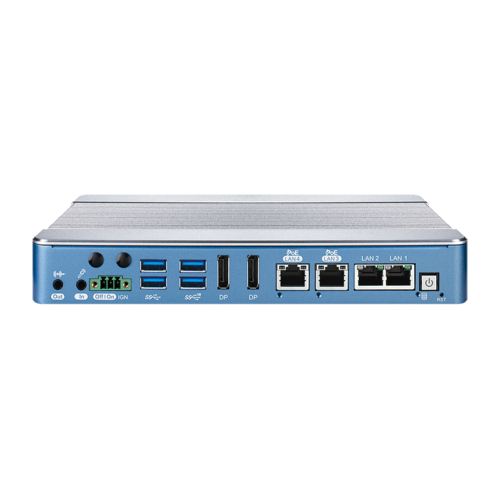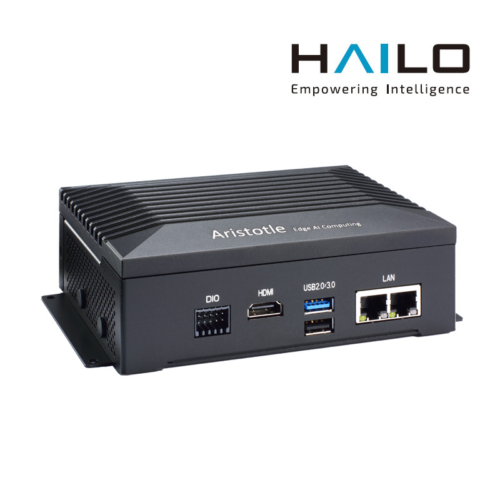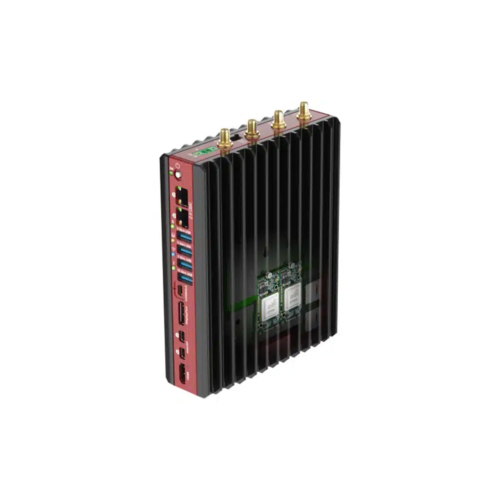Benefits of HAILO-8 AI Accelerators for Edge Computing
Hailo, an edge AI focused start-up, was founded in 2017 by a team of highly talented and experienced individuals who were all members of the Israel Defense Forces’ elite technology unit. Hailo specializes in the design and manufacture of Artificial Intelligence processors, meant to serve AI tasks such as Deep Learning on the edge of various industries and fields such as smart cities, automotive, intelligent transportation, retail, and more. AI and Deep Learning are breakthroughs that are changing how machines observe and process the environment around them and respond quickly to ever-changing circumstances. Bringing AI to the edge for Deep Learning provides many benefits:
- Faster processing and real-time decision-making
- Reduced latency by avoiding the need for cloud-based processing
- Improved data privacy and security as data is processed on-device
- Lower bandwidth and storage requirements due to processing data locally
- More efficient use of computing resources by minimizing data transmission
- Better user experience due to faster response times and reduced downtime
- Reduced costs associated with cloud computing
Hailo-8 is a cutting-edge AI processor that offers a holistic solution comprised of hardware and software. It features a proprietary novel structure-driven Dataflow architecture that delivers unprecedented performance, making it capable of processing full high definition (FHD) streams in real-time without down-sampling. The typical power consumption of Hailo-8 is only 2.5W, making it highly power-efficient capable of delivering 26 Tera Operations Per Second (TOPS). This, coupled with its smaller size and lower solution cost, makes it an ideal standalone processor or co-processor.
Hailo-8 AI Accelerators are available in mPCIe and M.2 form factors. The solutions offer easy hardware integration, requiring no additional external memory, and seamlessly integrates with popular software frameworks, ensuring smooth integration with existing workflows. The automotive and industrial-grade solution can be used in a wide range of applications, from autonomous vehicles to drones and industrial automation. Overall, the high power efficiency, smaller size, and unprecedented performance make Hailo-8 an essential component for any AI-based application.
The Hailo-8 AI Inference Processor can also deliver scalable performance via chip cascading, allowing for increased performance as needed. By connecting multiple Hailo-8 chips in a cascaded configuration, unparalleled computational power can be harnessed for handling complex AI workloads. This cascading architecture allows for scalable and parallel processing, enabling faster and more efficient execution of AI algorithms. It maximizes the utilization of available resources, optimizing the overall system performance and accelerating time-critical tasks. Available platforms with multi-chip processing include dedicated PCIe cards and MXM modules, making advanced edge AI applications more accessible.
Soldering Hailo-8 processors directly onto the motherboard is also an option, which brings forth a multitude of remarkable benefits. Firstly, this integration eliminates the need for additional hardware components, reducing complexity and streamlining the system architecture. With a compact and efficient design, the Hailo-8 processors seamlessly integrate into the motherboard, optimizing space utilization and enhancing overall system performance. This integration also ensures low-latency communication and minimizes power consumption, enabling faster and more energy-efficient operations. Moreover, by soldering the Hailo-8 processors directly onto the motherboard, the system achieves enhanced reliability and durability, as there are no external connections that could be prone to wear or malfunction. This robust integration paves the way for reliable and long-lasting industrial applications, offering a future-proof solution for edge computing with unrivalled processing power at the core.
Industrial Hailo 8 AI Inference Platforms

RSC100
Fanless Hailo-8 Edge AI Vision NXP i.MX8 Computer with Dual GbE

ABP-3000 AI-8145U
Low Profile Hailo-8 Edge AI Vehicle Computer with Ignition Control and EN50155

ABP-3000 AI-8665U
Ultra Slim Hailo-8 Fanless Edge AI PC with 4 Gigabit LAN and PoE

RSC101-J6413-S
Compact Hailo-8 Edge Computer with J6413 Elkhart Lake Quad Core CPU

RSC101-J6413-H
Industrial Hailo-8 Edge AI Computer with Quad Core CPU and 5G Connectivity

BEDROCK R7000 EDGE AI 30W
7040 Series AMD Ryzen Embedded AI System

BEDROCK R7000 EDGE AI 60W
AMD Ryzen 7 Industrial AI Platform

BEDROCK R7000 EDGE AI TILE
AMD 7840U Ryzen Industrial Hailo-8 PC
Deep Learning Processing Redefined
Hailo’s revolutionary architecture is a completely new and unique approach to the design of a specialized technology stack. This domain-specific processor is specifically optimized to achieve far better performance than the traditionally used Von Neumann architecture when dealing with deep learning tasks. The Von Neumann architecture, which utilizes a single shared memory, has been found to be inadequate for these kinds of tasks and has been surpassed by the performance of Hailo’s specialized architecture. This specialized architecture is able to provide much faster and more efficient processing power for deep learning tasks, which can drastically reduce the time it takes to complete these tasks.
Nvidia GPUs, on the other hand, are designed for high-performance computing and have a more traditional memory architecture. They typically have large amounts of memory, often using high-bandwidth memory (HBM) to handle large datasets and complex AI models. The memory is usually organized into multiple memory controllers, which are responsible for managing data transfer between the processor and memory. This design allows for high memory bandwidth and high memory capacity, which is essential for large-scale machine learning applications.
The Hailo-8 dedicated deep learning chip with dataflow architecture supplies an optimal solution to solving complex problems, outperforming conventional CPUs and single neural networks. This design features three elements which can be tailored to meet the needs of the customer:
Compute: Hailo-8 uses a proprietary structure-driven Dataflow architecture to provide high-performance compute capabilities. This architecture is optimized for deep learning and computer vision workloads, allowing Hailo-8 to deliver unprecedented performance while maintaining high power efficiency. Hailo-8 includes a high number of parallel processing engines that can perform multiple operations simultaneously, which enables the real-time AI processing of video streams without down-sampling.
Memory: Hailo-8 includes a large amount of on-chip memory, including SRAM and DRAM. This memory is tightly integrated with the compute elements to enable efficient data processing and reduce data movement, which helps to further improve the power efficiency of Hailo-8. Hailo-8 also supports external memory, but unlike other AI accelerators, it does not require additional external memory for efficient operation.
Control: Hailo-8 includes a control unit that manages the flow of data between the compute and memory elements. This control unit is responsible for scheduling tasks, managing memory access, and coordinating the flow of data between different parts of the chip. The control unit is also responsible for managing the interface between Hailo-8 and the host device, ensuring that data is transferred efficiently and securely.
The AI software package provides an extensive set of resources which can be used to construct deep learning structures and deploy AI technology into existing production systems. The model build environment simplifies the process of integrating with popular ML frameworks, allowing for quick and effortless integration with existing development processes. Furthermore, this runtime environment allows for easy integration and deployment into host processors, such as x86 and ARM based products.
Hailo Dataflow Compiler: The Hailo Dataflow Compiler is a software tool developed by Hailo that automatically converts deep learning models into executable code for deployment on Hailo’s edge AI processors. The Dataflow Compiler optimizes the model’s computation graph and data flow to ensure maximum performance and efficiency on the hardware. It also performs automatic quantization and compression to reduce the model’s memory footprint and improve inference speed. The Dataflow Compiler supports a wide range of deep learning frameworks, including TensorFlow, PyTorch, and Caffe, and can be integrated into existing development workflows.
Model Zoo: Hailo Model Zoo is a collection of pre-trained deep learning models provided by Hailo. These pre-trained models are optimized for deployment on Hailo’s edge AI processor and can be used for a variety of computer vision and natural language processing tasks, such as object detection, image segmentation, speech recognition, and more. The Hailo Model Zoo includes popular deep learning models such as YOLOv3, MobileNet, and ResNet, among others. These models can be used as a starting point for building custom solutions or for rapid prototyping of AI-powered applications.
Key Edge AI Applications For Hailo-8 Processors
Intelligent Transportation Systems: As reliable and timely data is essential for efficient road traffic management, the need for sophisticated traffic analysis is on the rise. Intelligent traffic systems are being utilized for a variety of purposes, such as traffic control, toll collection, law enforcement, and even smart parking initiatives. Due to the need for cost and efficiency, there is an increased demand for AI processing with low power and cost requirements. Hailo-8 offers extraordinary AI capabilities that allow for the use of advanced neural networks that can perform with great precision, even in high-traffic areas, while still meeting the power and cost expectations of typical ITS equipment.
Industry 4.0: Edge devices that possess artificial intelligence are essential for factory and warehouse automation, which enables manufacturers to become more efficient, reduce expenses, and increase productivity without sacrificing quality and safety. Industry 4.0 technologies such as automated robots and defect-detection cameras rely on edge AI processing. Hailo’s AI processor provides power and protection for these systems, enabling them to run round-the-clock in industrial settings.
Security & Surveillance: In the past, the evaluation of real-time video feeds typically required human judgement in order to detect and recognize activities taking place. The implementation of AI technology has revolutionized this process, providing a more efficient and reliable approach for recognizing events in these streams. The initial step of intelligent video analytics is recognizing the environment and extracting metadata, which can be used both to provide an immediate response and to store information for later retrieval and examination. Following the detection phase, the second level of video analytics involves reacting to pre-determined events in real-time. This could include sounding an alarm, or prompting a response from security personnel and emergency responders. The third layer in video analytics is indexing, storage and retrieval of metadata. Hailo-8 enables advanced analytics on the edge for improved performance at a lower total cost of ownership.
AI for Smart City Applications: As urban areas expand and encounter more difficult problems, the need for sophisticated data analysis increases. The viability and effectiveness of Smart City technologies are prompting more and more AI functions to be handled at the edge, which in turn is creating a requirement for more cost-effective and energy-efficient edge computing. Hailo’s AI processor has been created to help municipal authorities make cities safer and operate more efficiently by enabling deep learning-based video analytics to observe, signal, and generate valuable information on the spot.
Integrating Hailo-8 AI Accelerators At The Edge
Deploying computers at the edge requires a few essential points to consider. A computer designed to be used in tough environmental conditions should have a ruggedized construction that can withstand exposure to dust, moisture, extreme temperatures, and physical shock or vibration, which would cause regular computers to malfunction. Rugged edge computers are built to withstand these conditions and provide reliable performance in challenging environments. If you are looking for a rugged edge computer integrated with Hailo-8, here are some points to consider:
Compatibility and Expandability: Ensure that the rugged edge computer you choose is compatible with the Hailo-8 AI Chip. Look for a rugged edge computer that can provide enough processing power to take full advantage of the Hailo-8 accelerator, enabling fast and efficient AI processing. Hailo-8 supports up to PCIe Gen 3.0 x4, which is a common interface used for providing a high-bandwidth connection allowing for efficient data transfer and low latency AI processing.
Fanless Design: Having no fan is essential for edge computers used in harsh conditions. Removing onboard fans reduces the likelihood of failure caused by dust and other particles entering the device, or parts becoming dislodged.
Inputs and Outputs (I/O): Ensure that the rugged edge computer you choose has enough I/O options to connect to the sensors, cameras, and other devices needed for your specific application.
Operating Temperature Range: The Hailo-8 AI accelerator chip is designed to operate within a wide temperature range of -40°C to 85°C. When integrating the Hailo-8 into a system, it is important to ensure that the overall temperature range of the system is within the recommended operating range to avoid any potential performance or reliability issues.
Certifications: Look for rugged edge computers that have been certified for use in specific industries.
Deploying Edge AI Computing
After the Hailo-8 AI Accelerator has been incorporated into an Edge AI Computer, the following procedures need to be done to make it functional:
Install The Necessary Drivers: The necessary drivers need to be installed to enable communication between the edge PC and Hailo-8.
Integrate With Software Frameworks: Hailo-8 seamlessly integrates with popular software frameworks, making it easy to integrate into existing workflows. This can be done by installing the appropriate software libraries and APIs.
Verify Functionality: After integration is complete, it’s important to verify that Hailo-8 is functioning correctly. This can be done by running test applications that use Hailo-8 for AI processing.
We Can Help Deploy Hailo-8 At The Edge
Tell us about your application and a member of our team will get right back to you.
